Thai park exposes corruption claims and murky politics
- Published
Jonathan Head reports from Bangkok: ''The lese majeste is now being applied more widely than ever''
When the Thai army decided last November to use a plot of land it owns near the royal resort town of Hua Hin, to construct a park containing 14 metre-high bronze statues of seven past kings, it must have seemed an ideal way for the military to demonstrate its abiding loyalty to the monarchy.
A year later, Rajabhakti Park has become a millstone around the neck of the military government, and a symbol of how their efforts to promote the monarchy - at an awkward moment as Thailand faces its first royal succession in nearly 70 years - can go wrong.
The project has been tarnished by allegations of corruption - a scourge General Prayuth promised to tackle when he seized power last year.
Other government-backed ventures intended to showcase support for the monarchy have been similarly tainted. Not just by allegations of mismanaged funds, but also by the mysterious deaths in custody, or disappearances, of people who had been close to Crown Prince Vajiralongkorn.
The monarchy is an acutely sensitive topic in Thailand, made all the more delicate by the severity of the lese majeste law which inhibits any public debate about the institution.
The officially-sanctioned view of the monarchy is that it is loved and respected by all Thais, who support the law.
In fact, there are Thais who take a different view, but who do not dare to express it publicly.
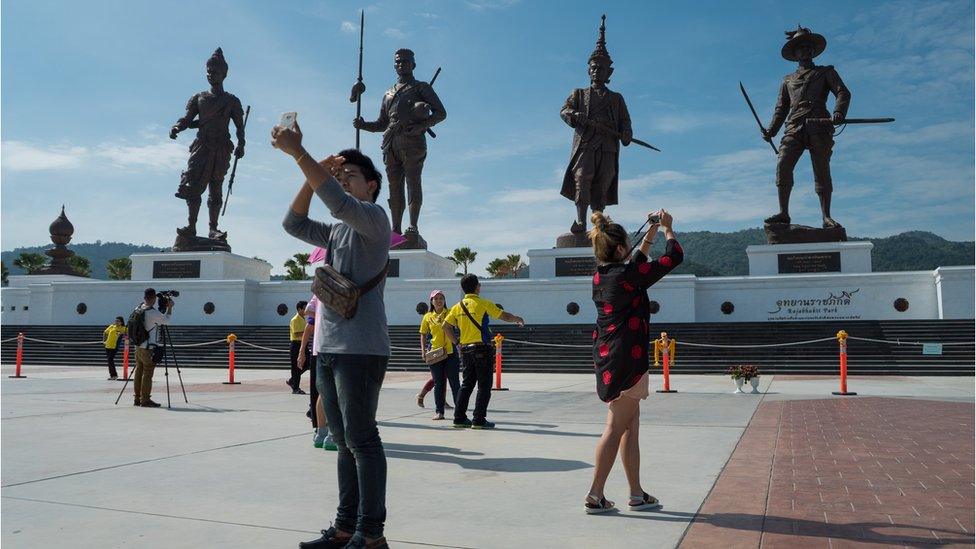
Few could have foreseen the problems that would arise from the creation of a park celebrating past kings
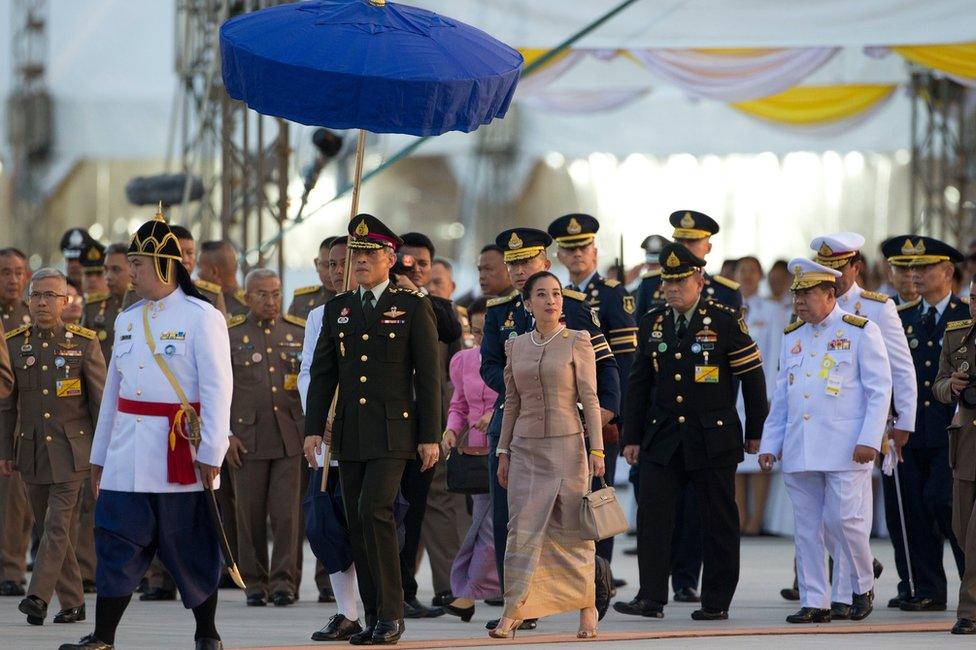
A number of people with ties to Crown Prince Vajiralongkorn, here at the park's opening, have died mysteriously
From the moment it seized power last year, the military made protecting the monarchy from any kind of critical scrutiny a top priority.
It ordered the police to be more rigorous in prosecuting anyone caught saying anything negative about the royal family. It insisted defendants be tried in military courts, and sometimes in secret.
Around 100 people have been charged with lese majeste since the coup, and sentences have become harsher, with one young mother-of-two being given a 28-year sentence in August.
At the same time, the military set about trying to burnish the public image of Prince Vajiralongkorn, in preparation for him to succeed the ailing King Bhumibol.
The lese majeste law makes it impossible for anyone in Thailand to speak frankly about members of the royal family. The commonly-used way to describe the comparison between the heir and the King is that "he does not enjoy the same popularity as his father."
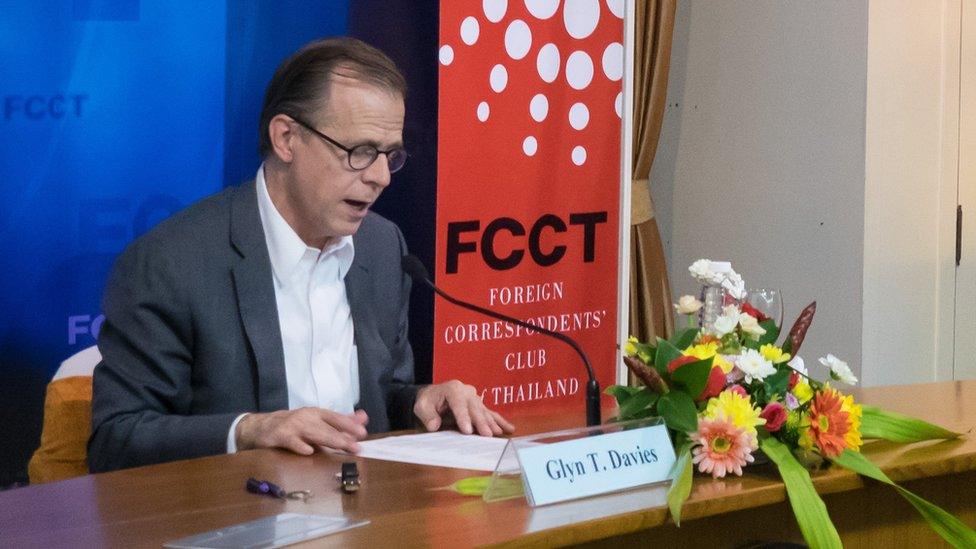
The US ambassador to Thailand is one of many under investigation for royal defamation, after he questioned lengthy sentences handed down for lese majeste, during a talk at Bangkok's Foreign Correspondents' Club
In August, the government organised a mass bicycle ride in Bangkok, led by the Crown Prince and his eldest daughter, in honour of Queen Sirikit, who is also in poor health.
It was the first time Thais had seen the 63-year-old prince in a relatively informal setting, smiling and looking trim in his cycling clothes.
The event was deemed a success, and the government held another one on Friday to commemorate the King's birthday.
Then in October three men were suddenly arrested and charged with lese majeste.
One, a famous fortune-teller and television personality known as Mor Yong, had played a prominent role in organising the first Bike for Mom event.
He and his two co-defendants, one of them an influential police officer responsible for countering anti-monarchy sentiment on the internet, were accused of abusing the Crown Prince's name to raise funds illicitly with products like t-shirts and badges linked to the bike rides.
Mor Yong had posted photos of himself with prominent public figures on his Facebook page, as part of his promotional activities.
Four days later, the government announced that the police major had hanged himself with his shirt in his cell.
Two weeks after that, they announced that Mor Yong too had died in custody, from blood poisoning. There was no proper autopsy and both men's bodies were hurriedly cremated.
At the same time the personal bodyguard of the Crown Prince disappeared. He has since been stripped of all his titles and accused of "gravely evil acts" against the monarchy. It is widely believed that he is dead.
Two other senior military officers have also disappeared, and have since been charged with lese majeste.
They have also been linked to alleged abuses in the funding of Rajabhakti Park, which was formally opened by the Crown Prince and his daughter in September.
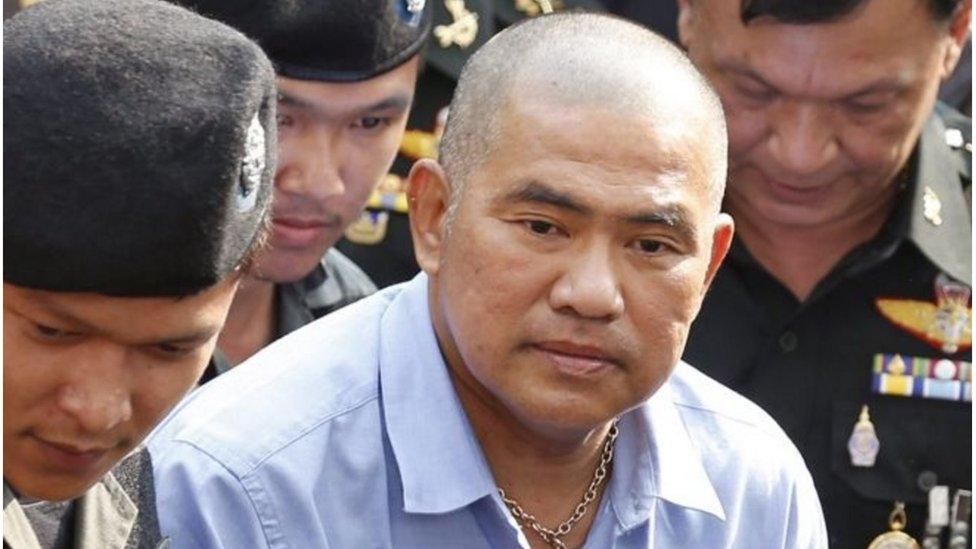
Many of those who have fallen foul of the crackdown, such as Mor Young, were previously in influential positions
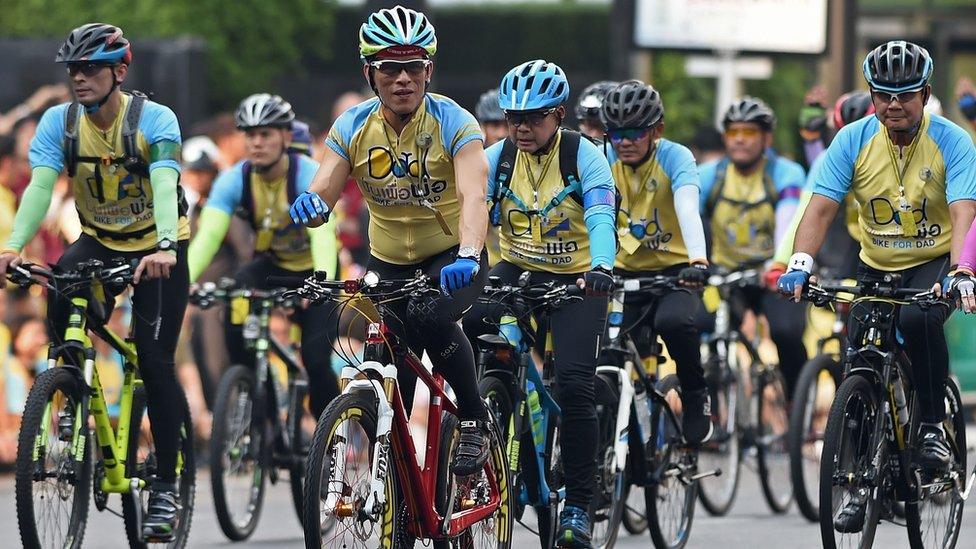
Thai Crown Prince Vajiralongkorn (centre) was among the thousands of cyclists who took part in Bike For Dad on 11 December
The government and the army have tried, and failed, to stem the tide of allegations surrounding the park.
General Udomdej Sitabutr, who was army commander until October this year and oversaw the project, admitted that irregular commissions were demanded by middlemen for the foundries building the huge statues, which cost around $1 million each. But he said he had insisted the commissions were refunded, although he explained the foundries then donated those commissions to an army charity.
There have been allegations of inflated prices paid for trees planted in the park too. And an initial denial that any government funds were used to build the park turned out to be untrue - around $2 million came from state coffers.
The army announced its own investigation, and quickly concluded there was no corruption. There was a public outcry, so the Ministry of Defence has ordered another investigation.
Major General Werachon Sukondhapatipak: "It is a test of the current administration"
The police say they cannot investigate unless the military authorises them to do so. A government spokesman told the BBC that independent agencies would soon be allowed to scrutinise the accounts of the project, but could not say when.
The government's opponents have jumped on the opportunity to illustrate what they say is hypocrisy on the part of the military in prosecuting former Prime Minister Yingluck Shinawatra for alleged corruption under her administration, yet failing to clean up its own house.
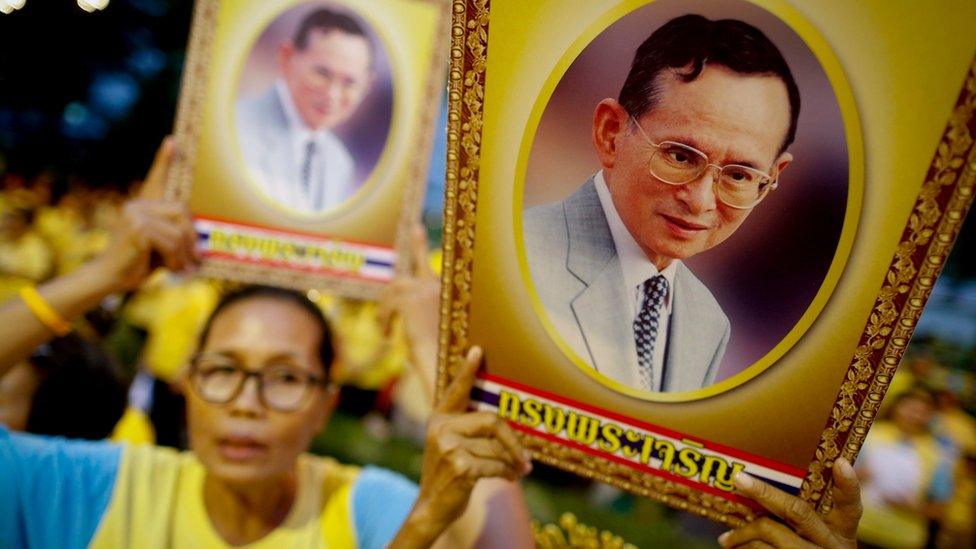
The Thai king is widely respected, making a smooth succession especially important
Student activists and leaders of the pro-Yingluck "red shirt" movement have tried to organise visits to the park, but have been stopped and detained by the army. The government has also charged some of those spreading negative information about the park with sedition, a serious offence which carries a penalty of up to seven years in prison.
Few people outside the top ranks of the military can know what lies behind these disturbing developments. But they show that the men who seized power last year, despite their considerable power, have nevertheless been unable to prevent damaging allegations of wrongdoing being made about their own royal promotion projects.
Nor have they been able yet to provide a convincing response to those allegations. Many people in Thailand believe the revelations indicate divisions at the top over how to handle the royal succession, and crucially, who has control over this historic transition.
- Published11 December 2015
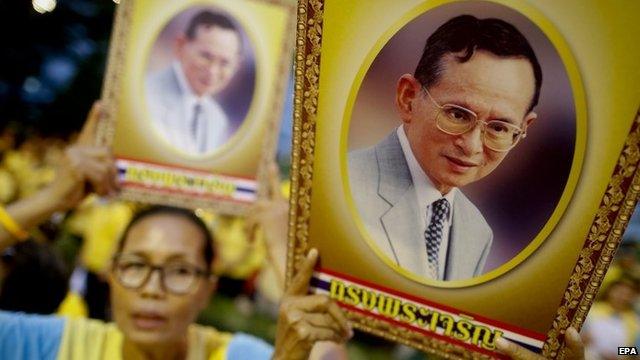
- Published9 November 2015
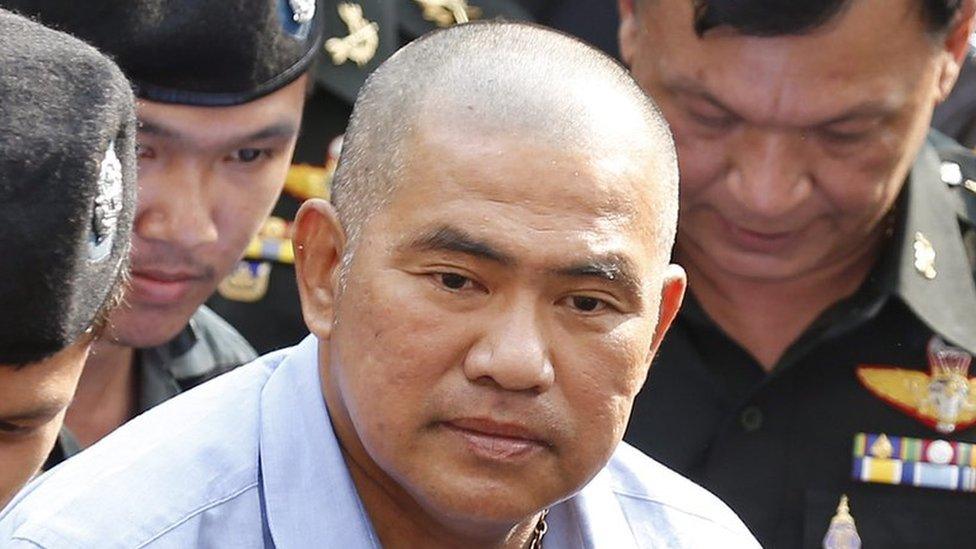
- Published28 October 2015
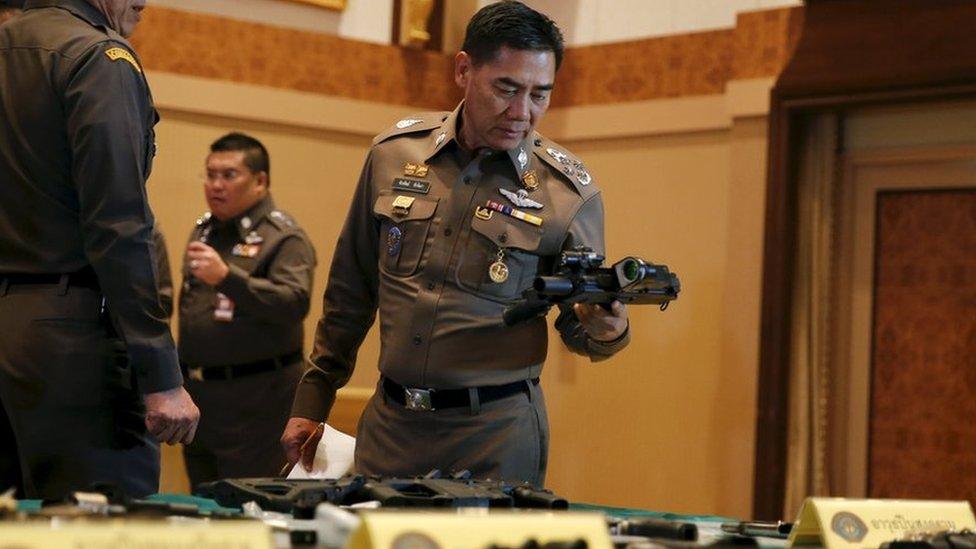
- Published27 November 2014